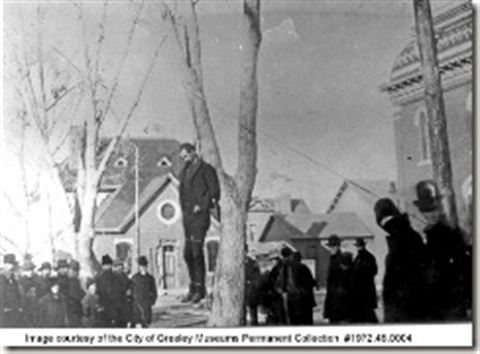The Story of W. D. French

By Mike Peters for Weld County Past Times.
Originally published on Saturday, July 17, 1999.
Mob Rules
An angry group of men weren’t about to let this guy avoid punishment
It was probably pretty obvious that something was up. After all, it’s not often that a man would dress like a woman and walk into a Greeley hardware store.
On Dec. 28, 1888, the man, wearing a veil over his face, entered the store and wanted to buy 50 feet of rope.
The hardware store owner knew what was going on. He refused to take money for the rope and reportedly said, “Take this and forget it. If you need any more, come back.”
But more rope apparently wasn’t needed. A gang of masked men broke into the jail that night, and lynched W.D. French, leaving him hanging from a downtown tree branch for the townspeople to find the next morning.
It was Greeley’s first and only lynching.
W.D. French, 41, was the town bully. He had been arrested once for cattle rustling, he carried a gun to intimidate people, and was suspected of murdering his wife the year before. He had beaten people and stole before. But his last crime, the murder of a store owner, was French’s swan song.
He was arrested a few days before, after Greeley mill merchant, Harry Woodbury was found in his store, dead of a gunshot wound. It was obvious who killed him. Two witnesses said they heard French and Woodbury arguing about the cost of 600 pounds of flour, and then saw French break into the store and then heard the gunshot.
Later, the .44-caliber bullet would be identified as the same ammunition that French used in his gun.
But townspeople, tired of French’s bullying techniques, thought he might get away with murder, because no one actually saw him shoot the merchant. Sheriff Jacob Wolaver, hearing rumors that a lynch mob might be formed, send extra deputies to guard the jail for the first few nights. As rumors died down, the sheriff relaxed his guard.
Then, at 1 a.m., Dec. 29, 1888, about 15 masked men appeared at the house of the sheriff, woke him and demanded the key to the jail. The sheriff later testified only one man spoke, and he used a fake Irish brogue.
When the sheriff refused to give them the key and the combination to the inner lock of the jail, they bound and gagged him and took him to the jailer’s house.
The jailer refused to give them a key, stating it was locked inside the county courthouse. Frustrated, the masked men left the jailer and sheriff together, and went to the jail.
Using hammers and crowbars, the men tore out the steel door of the jail, pulled French from among the other prisoners and walked to a nearby tree. Meanwhile, the sheriff and jailer were able to free themselves from their bonds. However, they decided to go back to sleep and didn’t discover French’s plight until daybreak.
French was hanged from a three in the heart of downtown Greeley, just steps from the jail. The jail was located in about the same location as today’s downtown jail, and the tree stood in an area between the present-day Weld County Courthouse and the Weld District Attorney’s Office.
Legend has it that the branch of the tree died and withered away soon after the lynching.
Apparently, no one mourned French. An editorial in the Greeley Tribune that week reflected the tone of the community: “…the general verdict was that in this instance at least, the victim richly deserved his fate. While we strongly dislike lynch law, in this particular instance we believed the man received his just desserts.”
Later, at an inquest, the Weld County Coroner determined that French’s death was the result of a felony, done by “parties unknown.” The case was closed.
French was buried in Linn Grove Cemetery, alongside his wife, who died 18 months before. In the southeast section of the cemetery, the French stone is a huge 8-foot spire of rose granite. It isn’t known who paid for the tombstone.
Mike Peters is a reporter and columnist for the Greeley Tribune.
Did You Know?
Greeley mill merchant Harry Woodbury was found in his store, dead of a gunshot wound, following an argument with French over the cost of 600 pounds of flour.